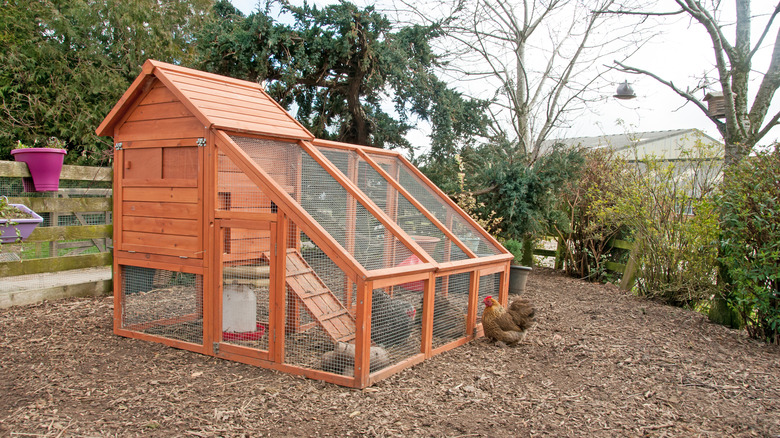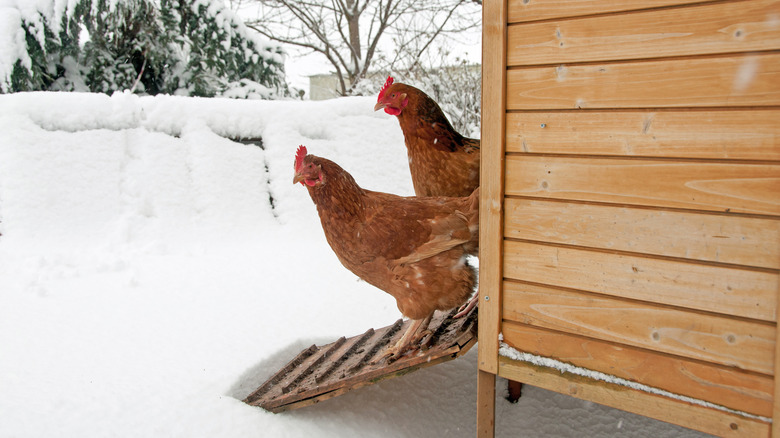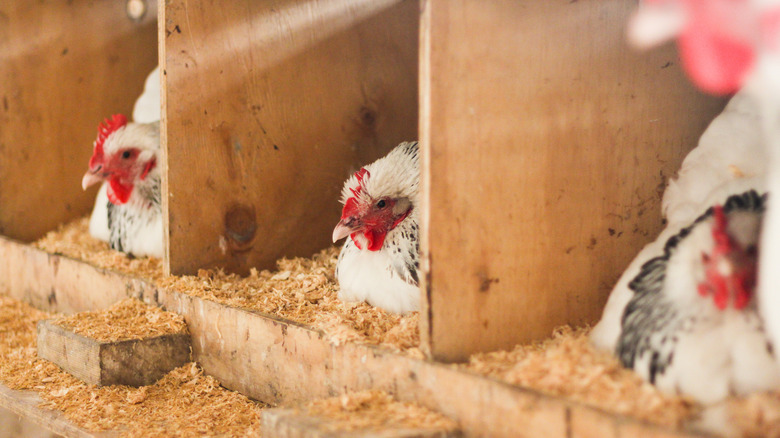3 Savvy Tips On How To Build The Best Chicken Coop
If you have a flock of chickens, you're probably familiar with the many benefits of a chicken coop. While you could raise free-range chickens, according to Talmage Farm & Garden Center, a coop will protect your flock from predators and harsh weather, give them a comfortable space to lay eggs, and make feeding time easier. A coop can also be an incredible addition to your backyard space. It can make your yard feel like the wholesome homestead you've always dreamed of.
You could easily build a chicken coop yourself. The Almanac outlines how to create this simple structure. You'll need to consider things like the best location, the ideal size, the best materials, latches, doors, ventilation, and electricity. Once these factors are considered, there are three more tips you'll need to keep in mind to finish the coop. These include considerations about the ramp, the nesting boxes, and the measures you'll take to keep the flock protected from predators.
Include a ramp
A ramp allows for chickens to easily access a raised coop. Eco Peanut says that it's always a good idea to raise your coop in order to protect your chickens from predators, moisture, and bad weather. An elevated coop will also make feeding, cleaning, and collecting eggs much easier, because you won't have to bend down to complete these tasks. The ideal width of a coop ramp is 8 to 10 inches. If you're not including rungs for stability, the ramp shouldn't be angled above 30 degrees. If you are including rungs, it can be raised to 45 degrees but no higher. The best ramps have many rungs to avoid sliding or injuries.
Technically, not every chicken coop needs a ramp. According to The Feather Brain, whether or not yours does depends on the following factors: the size and height of your coop door, the size of your chickens, and your chicken's feathers. If the door is high and small, you definitely need a ramp. If the chickens are large, a ramp is a good idea, so they don't hurt themselves when jumping down. And, if the chickens have short or clipped wings, you need a ramp. Overall, if you're in doubt about whether or not your coop needs a ramp, it's probably a good idea to include one.
Create cozy nesting boxes
Creating nesting boxes is essential to ensure your hens have a comfortable place to lay eggs. When designing boxes for your coop, HGTV says to keep them off the coop floor. This will allow them to stay cleaner. You should have one nesting box added to your coop for every four chickens you own. Interestingly, adding golf balls to unused nesting boxes may encourage your hens to lay more eggs, because they are more likely to lay in boxes that already contain eggs.
These nests can be made out of wood, plastic, or metal and lined with straw or sawdust. Backyard Chicken Coops, however, says that while wood looks visually appealing, it's also the hardest to clean. Nesting boxes could be repurposed from crates or basins that have been thoroughly cleaned. You could also add some unique elements to your nesting boxes to make them cozier. Edible flower petals could be added to make the nests more welcoming. Fresh or dried herbs could also be included. Consider also using lemon balm, lavender, or basil.
Protect the flock from predators
One of the most important things to consider when building a chicken coop is how you are going to protect the flock from predators. Backyard Poultry says to do your research about common predators in your area. Different animals will attack in various ways and at different times of day, so knowing which ones may be a threat is important. Also, make sure to keep the changing seasons in mind, as you may see more predator activity during the spring. Make sure to protect your chickens from your own pet dogs as well.
When designing your coop, make sure to cover any openings with welded wire. To protect the coop from burrowing predators like weasels, bury the wire 6 inches underground and a foot out from the edges of the coop. You can also install solar lights, cameras, or motion detection devices. Hobby Farms adds that tall fencing can also keep away predators. Locking your chickens in the coop at night will greatly improve their odds. Cutting the grass around the coop will eliminate places for predators to stalk your chickens. And getting a rooster or a guardian dog could help protect your hens from danger.



